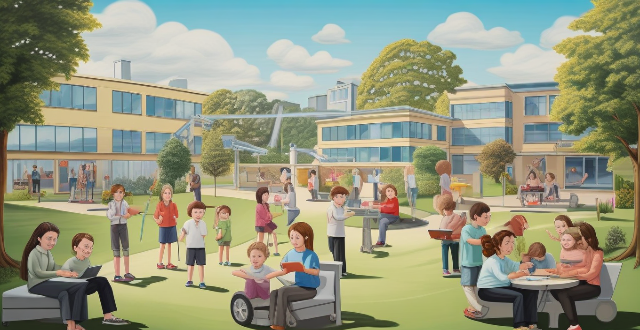The future of Huawei's AI technology is expected to have significant impacts on various aspects of society, including healthcare, transportation, education, and environmental sustainability. In healthcare, AI-powered medical imaging systems can diagnose diseases more accurately and efficiently, while personalized treatment plans can be developed based on patient data. In transportation, self-driving cars powered by machine learning algorithms can adapt to changing road conditions, reducing the risk of accidents caused by human error. In education, AI-powered educational platforms can provide personalized learning experiences for students, bridging the gap between traditional classroom teaching and individualized learning. Finally, in environmental sustainability, AI technology can optimize energy consumption through smart grids and reduce waste through AI-powered recycling systems. Overall, Huawei's AI technology has the potential to improve efficiency, accuracy, and personalization across different domains, shaping our future world.

The Future of Huawei's AI Technology and Its Impact on Society
Huawei, a leading global technology company, has been investing heavily in artificial intelligence (AI) research and development. The future of Huawei's AI technology is expected to have significant impacts on various aspects of society, including healthcare, transportation, education, and more. In this article, we will explore the potential future of Huawei's AI technology and its implications for society.
Healthcare
One area where Huawei's AI technology could have a significant impact is healthcare. With the help of AI, medical professionals can diagnose diseases more accurately and efficiently. For example, Huawei's AI-powered medical imaging systems can analyze X-ray images and detect abnormalities that may be missed by human doctors. This technology can also assist in developing personalized treatment plans for patients based on their unique medical histories and genetic profiles.
Key Points:
- Accurate diagnosis through AI-powered medical imaging systems
- Personalized treatment plans based on patient data
Transportation
Another area where Huawei's AI technology could make a difference is transportation. Self-driving cars are becoming increasingly popular, and Huawei's AI technology can play a crucial role in making them safer and more efficient. By using machine learning algorithms, self-driving cars can learn from their experiences and adapt to changing road conditions, reducing the risk of accidents caused by human error.
Key Points:
- Safer and more efficient self-driving cars
- Machine learning algorithms for adaptive driving
Education
Huawei's AI technology can also revolutionize the education sector by providing personalized learning experiences for students. With AI-powered educational platforms, students can receive tailored feedback and recommendations based on their learning styles and progress. This can help bridge the gap between traditional classroom teaching and individualized learning, allowing students to reach their full potential.
Key Points:
- Personalized learning experiences for students
- Tailored feedback and recommendations based on learning styles and progress
Environmental Sustainability
Finally, Huawei's AI technology can contribute to environmental sustainability by optimizing energy consumption and reducing waste. For example, smart grids powered by AI can predict energy demand and adjust supply accordingly, reducing the need for excess power generation and minimizing energy waste. Additionally, AI-powered recycling systems can sort and process waste more efficiently, reducing the amount of waste sent to landfills.
Key Points:
- Optimizing energy consumption through smart grids
- Reducing waste through AI-powered recycling systems
In conclusion, the future of Huawei's AI technology holds immense potential for transforming various aspects of society. From healthcare to transportation, education, and environmental sustainability, AI has the power to improve efficiency, accuracy, and personalization across different domains. As Huawei continues to invest in AI research and development, we can expect to see even more innovative applications that will shape our future world.